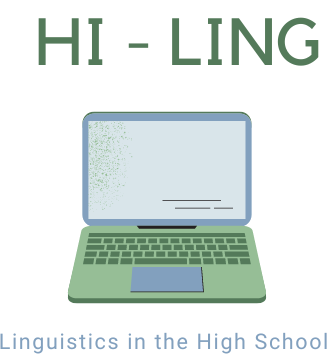HI-LING
LINGUISTICS IN THE HIGH SCHOOL

UNIT 2: VIOLATION OF MAXIMS
Introduction to Psycholinguistics
What is this field of linguistics all about? This lesson provides some context before you deep dive into the other subfields.

DO YOU KNOW HOW YOU ARE ABLE TO READ THIS SENTENCE?
Language serves a central role in our daily lives, be it talking about complex thoughts and ideas, ordering lunch, reading a magazine, or persuading someone to do a favor. It’s hard to imagine going through an entire day without using it—without reading, producing, or understanding a single word. Picture for moment what it would be like if you needed to get a ride from a friend to the airport next Saturday but couldn’t use language in any form to communicate—how would you ask? How would you know that your friend understood and would give you a ride at the right time (or not)? For that matter, how would you have booked your flight in the first place?
Language is everywhere in human society, across every culture. For most people, it is an effortless ability that we acquire before we learn how to dress ourselves. Some people feel that they even think using language, that an important part of their thoughts involves a kind of internal monologue. Yet, language is not a simple thing—it is actually quite complex and we need to be able to use it quickly. In fact, its timing is so crucial that even minor delays during the processing of language are thought to have profound consequences. So, by understanding how language works and how we are able to use it, we can understand a vital yet complex part of our daily lives, offer ideas for how to help people with language disorders, and perhaps even shed light on how we think.
WHAT IS A PSYCHOLINGUIST?
As the name suggests, it is someone who studies phenomena in the intersection of linguistics and psychology (or a deranged linguist, of course!). But this does not really answer the question, it just pushes back. So, first—what is linguistics? It’s the scientific study of language. Psychology? The scientific study of human behavior and cognition (i.e., how we think). The union of these two fields is principally concerned with the processing and knowledge representations that under- lie the ability to use language, and how they relate to other aspects of human cognition. In short, psycholinguistics asks the question: How it is that people are able, moment-by-moment, to produce and understand language? And, by extension, how do children come to have this ability? How and why it is some- times impaired after brain damage?
...AND SO WHAT IS PSYCHOLINGUISTICS?
The term “psycholinguistics” is a little bit misleading in that it minimizes the contribution of about a half-dozen other fields of scientific research. To truly get to the bottom of how language works, we need expertise not only from linguistics and psychol- ogy but also from other scientific fields such as neuroscience and computer science. The whole endeavor of psycholinguistics often finds a home in the broader research field of cognitive science—an interdisciplinary field that addresses the difficult question of how animals, people, and even computers think.
Why the need for at least four research fields to understand something as seemingly trivial as language—something that most people have pretty much mastered before they turn four? As I mentioned earlier, language is more complicated than it might first appear, and so it is the very ease of use that makes it so interesting. Let’s start with an analogy—walking around is also pretty easy for most people and it is something that we usually learn to do even before we learn how to talk. But can you explain exactly how it works—how each muscle, bone, and tendon allows us to defy gravity at every step? It’s easy to do but hard for a layman to explain how it works—instead it takes an army of biologists, physiologists, and others to explain this “easy” skill. Language is very much the same—its function is easy to master (when you’re young), but hard to explain. And, like walking, we have a lot to gain by understanding it.